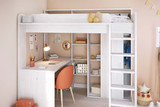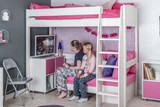Areas of the House That Should Be Banned For Kids
Most parents have areas of the house they want to keep their children out for various reasons. Younger children should be kept away from dangerous chemicals and tools. Older children are curious and parents may which to maintain their privacy. Consider the following when making a decision to make certain areas of the house remain private and exclusive.
Some Rooms Contain Danger
- The laundry room, kitchen, basement, and the garage are all places where chemicals are stored.
- Laundry rooms have detergents, fabric softeners, and stain removers, all of which are toxic if ingested.
- Under the sink storage areas have cleansers, furniture polish, and other cleaners which contain hazardous chemicals.
- The garage usually has dangerous tools, paints, varnishes, and other potentially dangerous items.
- Access to basements frequently have steep and dangerous stairs. Tools, chemicals, and electrical and heating sources also present dangers.
Some Rooms Should Be Available for Guests
There is nothing worse than having people come to a house with no area for siting and talking that has not been taken over by toys and kids. Many families decide the kitchen and formal dining areas are off limits to children.
Some Rooms Should Be Private
Home office, parents’ bedrooms, and master bathrooms are all areas many parents believe should be off limit to children. There is logic to this decision. You do not play in your child’s room, so why should they play in yours?
How to Decide If a Room Should Be Off Limits
Ask yourself the following questions when deciding if a room should be off limits for your children:
- Is the room safe?
- Are their dangerous chemicals.
- Are your children young enough that some items such as paper clips may present a choking hazard?
- Are their craft or sewing supplies with scissors, knives, or other sharp objects?
- What age and level of responsibility are your children?
Follow these guidelines when determining which rooms should remain private:
Decide which rooms, if any, should be off-limits for children. You may decide only a portion of a room needs to be off limits – the closet in an office or bedroom, for example.
Make sure you communicate with your children the reason for your decision if they are old enough to understand. A discussion of the need for privacy can be a learning experience for your children.
If you child can be in a room only with your presence, let them know ahead of time. You may not mind having your children work on their homework in a corner of your office as long as you are in the room with them.
Make sure you consistently enforce any decisions you make concerning rooms that are off limits, with appropriate consequences for not adhering to your rules.
If your children are very small, simply keeping doors closed may be sufficient. Our teenage daughter hated having her little sister mess up her stuff, so we installed a lock and the key was kept on a hook on the door jamb, too high for little sister, but within our daughter’s reach and ours. Whatever you decide about limiting your children’s access to various rooms, be prepared to make adjustments as they grow, assume more responsibility, and begin to spend more time assisting in family projects and activities.
Recent Posts
-
Unlocking the Potential of High Sleeper Beds for Teenagers
As teenagers go through all the ups and downs of being a teen, their likes and dislikes change a lot
-
Choosing Between a High Sleeper Bed vs. Mid Sleeper Bed
As your little one grows, so do their needs, and finding the perfect kids’ bed for them becomes









